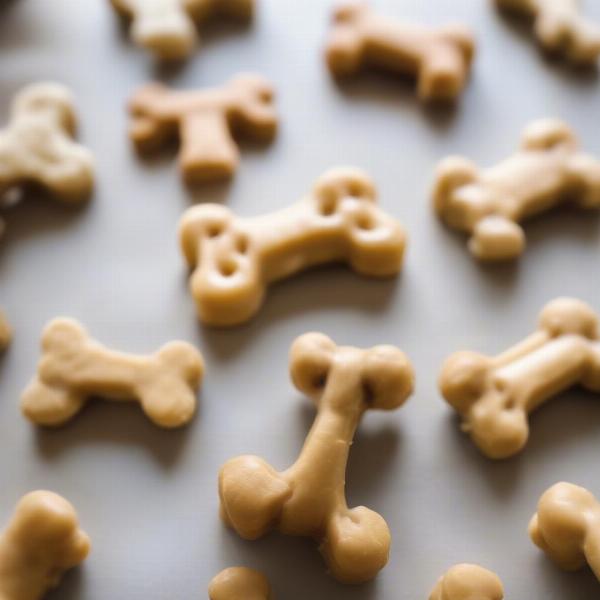Cheese can be a tasty and healthy treat for your dog, but it’s important to choose the right types and feed it in moderation. Certain cheeses are lower in lactose and fat, making them easier for your dog to digest. This article will guide you through selecting the best cheese treats for your furry friend, ensuring a happy and healthy snacking experience.
Which Cheeses are Safe for Dogs?
While many dogs can tolerate cheese, some types are better than others. Look for low-fat, low-sodium options like cottage cheese, mozzarella, and string cheese. These are generally easier on a dog’s digestive system. Avoid cheeses with high fat content like brie or blue cheese, as these can cause pancreatitis. Also, steer clear of cheeses with added ingredients like garlic or onions, which are toxic to dogs.
How Much Cheese Can My Dog Eat?
Moderation is key when it comes to cheese treats. Too much cheese can lead to weight gain and digestive upset. A small piece of cheese is a perfect occasional treat for most dogs. Consider your dog’s size and activity level when determining portion size. If your dog has any dietary restrictions or health concerns, consult your veterinarian before introducing cheese into their diet.
Making Homemade Cheese Treats for Dogs
You can even make your own cheese treats! Simple recipes using dog-safe cheeses mixed with other healthy ingredients like peanut butter or carrots can be a fun and rewarding way to spoil your pup. Just remember to keep the ingredients simple and avoid any harmful additives.
 Homemade Cheese Dog Treats
Homemade Cheese Dog Treats
Are There Any Dogs Who Shouldn’t Eat Cheese?
Some dogs are lactose intolerant, meaning they have difficulty digesting lactose, the sugar found in milk and cheese. If your dog experiences diarrhea or vomiting after eating cheese, they may be lactose intolerant and should avoid it. Always monitor your dog after introducing a new treat to their diet.
Can Puppies Eat Cheese?
Puppies, like adult dogs, can enjoy small amounts of low-fat, low-sodium cheese. Introduce cheese gradually and watch for any signs of digestive upset. Cheese can be a great way to reward good behavior during training.
Chili Cheese Dog Casserole Tater Tots? Maybe Not for Your Pup!
While some human foods containing cheese are safe for dogs, many are not. Dishes like chili cheese dog casserole tater tots often contain onions, garlic, and excessive amounts of fat and spices that can be harmful to dogs. chili cheese dog casserole tater tots are best enjoyed by humans only. Stick to simple cheese treats for your canine companion. Another potentially harmful treat for your dog is jalapeno hot dog due to the jalapeno peppers.
Conclusion
Cheese can be a healthy and delicious treat for dogs when given in moderation and chosen wisely. Stick to low-fat, low-sodium varieties and avoid any cheeses with added ingredients like garlic or onion. If you’re unsure about which cheeses are safe for your dog, consult your veterinarian. liver cake recipe for dogs is a great alternative treat option. For other treat ideas, consider exploring options like filled bones for dogs.
FAQ
- Can dogs eat cheddar cheese? While a small amount of cheddar is usually okay, it’s higher in fat than other options. Opt for low-fat cheeses instead.
- What if my dog eats too much cheese? Watch for signs of digestive upset like vomiting or diarrhea. If these occur, contact your veterinarian.
- Is cheese good for training treats? Yes, small pieces of cheese can be a motivating reward during training sessions.
- Can senior dogs eat cheese? Yes, as long as they don’t have any underlying health conditions that restrict dairy.
- Can I give my dog cheese every day? It’s best to give cheese as an occasional treat rather than a daily staple.
- What are some other healthy treats for dogs besides cheese? Fruits and vegetables like carrots, apples (without seeds), and blueberries are good options. You can even check out recipes like this one for hot dog and cream cheese.
- Are there any signs that my dog is allergic to cheese? Look for symptoms like itching, skin redness, or gastrointestinal issues.
ILM Dog is a leading online resource dedicated to providing expert advice and information on all aspects of dog care and wellbeing. We offer a wealth of knowledge on dog breeds, health, training, nutrition, grooming, and much more. Our mission is to empower dog owners worldwide with the tools and resources they need to provide the best possible care for their furry companions. From selecting the perfect breed to understanding their nutritional needs, ILM Dog is your trusted source for reliable, practical information. Contact us at [email protected] or +44 20-3965-8624 for personalized guidance and support.